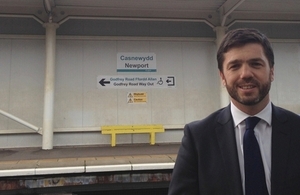Wales Office Minister: HS2 is a central part of our ambition to build a stronger UK economy
Stephen Crabb MP writes for the Western Mail on the benefits of HS2 to the Welsh economy

Stephen Crabb MP at Newport Station
Wales stands at the threshold of an era of unprecedented investment in railway infrastructure. For the first time since the mid 1800s a new vision is unfolding of how major rail investment can help power economic growth.
Rail electrification in Wales, coupled with the transformational effects of HS2 throughout the UK, will help lay foundations for a step-change in Welsh economic performance as our key markets become closer and movement between them more efficient.
Born in the heat of the industrial revolution, railways continue to support our economy in a profound way. The digital revolution has not reduced demand for the physical movement of people, goods and services; it has helped fire-up that demand even further.
It is more than 170 years since Isambard Kingdom Brunel and Robert Stephenson, chief engineers on the Great Western Railway and Chester & Holyhead Railway, respectively forged heavy rail links between England’s new centres of commerce and Welsh ports and industrial heartlands.
This same rail infrastructure, built by men of incredible vision and tenacity, continues to provide key arteries of the Welsh economy. But our 19th century railway is struggling to cope with the demands of the 21st century.
Every year in Britain trains carry 1.5 billion passengers and 100 million tonnes of goods. In the last decade alone passenger numbers have risen by 54%, and by 2020 an extra 400 million journeys per year are expected to be made. In Wales, demand is increasing even faster. Since 2000, passenger journeys beginning or ending in Wales have increased by 65%, with further predicted growth of 31% by 2019.
Without enormous infrastructure investment this growth will be choked off as capacity fills up and the consequences and costs to the Welsh economy will be severe.
The solution proposed by UK Government is an unprecedented investment package to modernise our railways, releasing space on crowded lines and bringing the whole country closer together. Central to this is the High Speed Two rail network which will provide major new capacity through the very heart of the UK.
Our ambitious programme of rail electrification, signalling upgrades and station improvements are also key components of this package and Wales will be a beneficiary at every stage.
When the Coalition Government was formed Wales was the only European country, apart from Albania, without any electrified lines. We are determined to change this. We will deliver the first electric trains to Wales through the electrification of the London to Swansea route and of the Valley lines into Cardiff.
In the coming years Network Rail will undertake an ambitious modernisation plan in Wales, renewing tracks and replacing ageing signalling equipment across Wales and the border counties. This includes signalling improvements from Newport to Shrewsbury and Flint to Llandudno, improving line speeds and increasing our ability to run more trains.
But as important as this set of improvements within Wales is, the real economic benefit comes about through the interaction with other projects elsewhere on the network, like HS2, which will improve Wales’s connectivity to UK and international markets.
The current insular nature of Welsh politics all too often reduces the debate on rail from a discussion about strategic UK-wide investment, to one looking at the narrow benefits of improving only those lines that run within our borders.
But no single project should be looked at in isolation from the bigger vision.
As a result of the £1 billion electrification of the Great Western Mainline, the £895 million unclogging of the Reading bottleneck, coupled with the £14.8 billion Crossrail project in London, passengers and businesses in South Wales will see the benefits of faster links straight into Europe’s largest financial centre.
Cardiff to Canary Wharf in two hours is going to become a powerful part of the inward investment message with Cardiff’s own financial and legal sectors set to expand in the decades ahead.
Furthermore, the planned £500million investment in a direct link between Reading and Heathrow is a vital investment for Welsh business. It could cut 30 minutes off the journey from south Wales to Heathrow Airport.
All of these opportunities will be enhanced even further through the HS2 interchange at Old Oak Common which will connect the improved Great Western line to Britain’s new high speed network.
For North Wales the planned HS2 hub station at Crewe will provide access to high speed passenger services and unlock new employment and business opportunities in the region. North east Wales and north west England form one single economic entity and HS2 will foster even closer integration.
But the vision goes even further, because HS2 will also help strengthen the business case for electrification of the north Wales lines. Electrification in north Wales would ensure that Wales maximises the benefits from the investment in HS2 and allow through services to Holyhead. The Wales Office is working closely with local authorities and business groups in North Wales to to develop this business case.
HS2 is a central part of our ambition to build a stronger economy across the UK. KPMG estimates that HS2 could boost the UK’s economy by £15 billion per year within five years of the network opening.
There are clear benefits from the outset for those living in Wales. But these benefits multiply when the other major projects which comprise our vision for rail are factored in.
As in the days of Brunel and Stephenson there is no shortage of people who are determined to spread doubt and aim low. Investment on this scale is certainly daunting. But the prize for the Welsh economy is too big to allow insularity and lack of ambition to get in the way of a new era of growth for our railways.
- To view the article, please visit the Wales Online website here